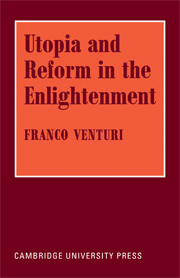III - From Montesquieu to the revolution
Published online by Cambridge University Press: 07 October 2011
Summary
By the middle of the eighteenth century not only did the ancient republics occupy a position of marginal importance compared with the absolutist states, but they were also on the fringe of history itself. Their political importance decreased, while economically the former centres of a flourishing commercial and manufacturing life entered a phase of irreversible decline, the rate and gravity of which varied according to whether it was taking place in Holland or Genoa, Venice or Lucca. The archaic republics survived, but became increasingly distant from the vital centres of Europe, from the centres of convergence and opposition of economic and military forces. Sometimes they lived, like Venice, in a limbo of memories and traditions, convinced of their own continuity and perpetuity. The more their activity decreased, the more they abandoned themselves to the conviction that they existed outside and beyond the hard contingencies which caused strife and internal transformation in other European states.
Ideologically too, the republican ideas seemed to have lost their hold on a political level. They no longer offered an alternative to the ideas and practice of an absolutism which was then beginning to take on the characteristics of the nascent Enlightenment. Neither on the political nor on the theoretical plane, did they seem able to compete with the system then prevailing of natural law. Yet even republican ideas survived. They continued to count in the sphere of morality and customs if not politically.
- Type
- Chapter
- Information
- Utopia and Reform in the Enlightenment , pp. 70 - 94Publisher: Cambridge University PressPrint publication year: 1971
- 1
- Cited by



